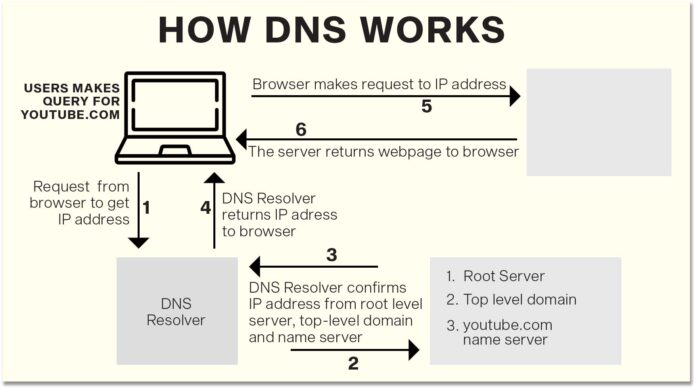Every time you enter a website name on the internet, for instance Facebook.com, this search query goes to a DNS server operated by your internet service provider (ISP). The DNS is responsible for taking that name and matching that to an IP address for that website address.
Think of DNS as a phonebook for the internet which has information on IP addresses associated with the billions of domain names on the internet. Each unique domain name would have one or more IP addresses associated with it. Just like in real life phonebooks you can look up for phone number(s) of individuals, DNS is where these phone numbers of websites translated into their IP addresses could be looked up.
So when you put up a search for Facebook.com, the DNS would look up for the IP address for the server hosting Facebook.com, and let the browser at your computer know that this IP address is where Facebook.com could be accessed. The browser then sends a connection request to that IP address to retrieve the Facebook.com webpage.
While users enter website names, at the back, internet routing is taking place on the basis of IP addresses. It is only for the convenience of users so that they don’t have to remember IP addresses for websites that these IP addresses are converted into and searched as website names. Just like phone numbers for people, websites can have multiple IP addresses. It is the DNS that identifies which IP address to look for, and what the other IP addresses are in case one of the IP addresses is down.
“That is all the DNS does. It is a globally distributed internet phonebook. It says that every name on the internet can only be reached by having a phone number. In the internet terms, that phone number is an IP address,” said a network engineer at one of the big technology companies, during a deep background conversation with Profit.
Users can access websites directly as well by putting IP addresses of the servers hosting these websites, in which case DNS is not involved. But a majority of people would not know what the IP address of the website they are searching for is. Even if they did know, they would not be able to remember it, or wouldn’t be able to remember many IP addresses at the same time. Think about a situation where you have to remember a twelve digit number each for Youtube, Facebook, Google and Netflix, and use that number each time you want to access one of these sites. It is going to be painful.
All major internet service providers in Pakistan have their own DNS servers which check if the IP address of the website a user has searched for is the latest one or not, and then direct the user to that IP address.
Different ISPs have their own DNS servers that give the DNS a distributed nature. So if PTCL’s DNS server is not working, it will not affect users of another ISP.
























